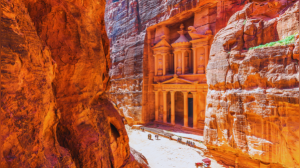UNESCO World Heritage sites represent the pinnacle of cultural and natural significance, recognized for their universal value to humanity and safeguarded for generations to come. These sites must possess exceptional historical, cultural, and architectural merit. Here is a curated list of ten iconic heritage sites, each a testament to human achievement and natural wonder.

Entering Petra is like stepping onto a grand stage carved from sandstone. This ancient Nabataean city, sculpted directly into the pink cliffs, reveals itself dramatically at the end of a narrow gorge. Despite its countless depictions in photographs, experiencing Petra firsthand leaves visitors breathless.

Like a giant's sketch across the land, the Great Wall snakes over mountains. More than just a lengthy structure, it embodies centuries of defense, resolve, and dynastic ambition. Standing atop this wall evokes a sense of invincibility, a testament to the ingenuity of its builders who constructed it without modern machinery.

Surpassing logic in age and sharper than modern skyscrapers, the Pyramids of Giza remain mathematically enigmatic. Unaffected by cameras or desert heat, they have captivated humans for 4,500 years and will continue to inspire awe.

Perched high in the Andes, Machu Picchu is both an Incan masterpiece and a puzzling enigma. Whether it served as a sacred sanctuary or an ancient escape, the breathtaking views are sure to leave a lasting impression.

Glowing at sunrise, dazzling at midday, and silhouetted at dusk, Angkor Wat is more than a temple; it's a living spectacle of light. As the world’s largest religious monument, it carries its fame with quiet, sandstone serenity.

You may have seen arenas, but none compare to the original. The Colosseum once hosted gladiators, wild animals, and emperors of dubious character. Today, it offers a captivating experience filled with history and wonder, minus the lions.

The Taj Mahal stands as an iconic symbol of love and Mughal architecture. Built by Emperor Shah Jahan in memory of his wife Mumtaz Mahal, this white marble mausoleum features intricate inlay work and symmetrical gardens, remaining one of the most admired and visited monuments worldwide.

Easter Island is famed for its enigmatic moai statues: massive stone figures carved by the island’s early inhabitants. Scattered across the volcanic landscape, these statues reflect a rich Polynesian culture and spiritual tradition, making the island a powerful symbol of human creativity and mystery.

The Palace of Versailles, a UNESCO World Heritage Site, symbolizes absolute monarchy and French grandeur. Once the royal residence of Louis XIV, it boasts opulent halls, ornate gardens, and the renowned Hall of Mirrors, a masterpiece of 17th-century art and architecture located just outside Paris.

Stonehenge, a UNESCO World Heritage Site in southern England, ranks among the world’s most iconic prehistoric monuments. Dating back over 4,500 years, this mysterious stone circle continues to fascinate historians and archaeologists. Believed to have served ceremonial or astronomical purposes, its exact function remains debated.
Newer articles
Older articles
 Vijay Officially Named TVK's Chief Minister Hopeful for Tamil Nadu's 2026 Election
Vijay Officially Named TVK's Chief Minister Hopeful for Tamil Nadu's 2026 Election
 RJ Mahvash Prioritizes Work Over Buzz, Addresses Link-Up Speculation
RJ Mahvash Prioritizes Work Over Buzz, Addresses Link-Up Speculation
 Which Chair Would You Choose? This Personality Test Reveals Surprising Insights
Which Chair Would You Choose? This Personality Test Reveals Surprising Insights
 UNESCO's World Heritage Wonders: Unveiling 10 Iconic Sites, From Petra to the Pyramids
UNESCO's World Heritage Wonders: Unveiling 10 Iconic Sites, From Petra to the Pyramids
 JPG to PDF: A Comprehensive Guide for Graphic Designers & Professionals
JPG to PDF: A Comprehensive Guide for Graphic Designers & Professionals
 Shadman Islam Defends Bangladesh Batters After Day 1 Struggles Against Sri Lanka
Shadman Islam Defends Bangladesh Batters After Day 1 Struggles Against Sri Lanka
 iQoo Z9 Turbo: Rumored Specs Emerge – Snapdragon 8s Gen 3, 6000mAh Battery Highlighted
iQoo Z9 Turbo: Rumored Specs Emerge – Snapdragon 8s Gen 3, 6000mAh Battery Highlighted
 Tick Bite Paralyzes Fitness Influencer: A Wake-Up Call for Outdoor Enthusiasts
Tick Bite Paralyzes Fitness Influencer: A Wake-Up Call for Outdoor Enthusiasts
 5 Often-Missed Warning Signs of Bladder Cancer You Need to Know
5 Often-Missed Warning Signs of Bladder Cancer You Need to Know
 KL Rahul Puts Country First, Prioritizes England Tests Over Newborn Child
KL Rahul Puts Country First, Prioritizes England Tests Over Newborn Child